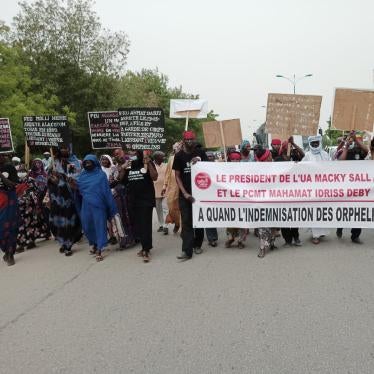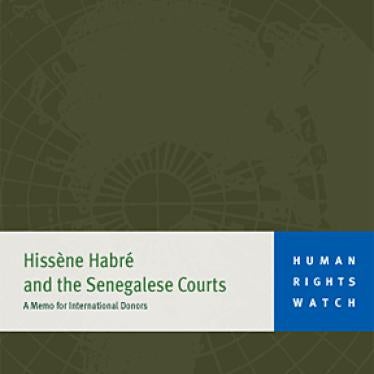(Brussels) - The Senegalese National Assembly’s adoption on Wednesday of a law to allow Senegalese courts to try the exiled former dictator of Chad, Hissène Habré, is an important step toward justice, Human Rights Watch said today.
Habré was first arrested in Senegal in February 2000 on charges of crimes against humanity and torture stemming from his 1982-1990 rule in Chad. Senegal refused to prosecute him in 2001 or to extradite him to Belgium in 2005, but in 2006, Dakar agreed to abide by an African Union decision that Habré should be put on trial in Senegal. Wednesday’s law allows such a trial by permitting Senegal to prosecute cases of genocide, crimes against humanity, war crimes and torture, even when they are committed outside of Senegal.
At the same time Human Rights Watch took issue with an estimation by Senegal’s Foreign Minister Cheikh Tidiane Gadio on Tuesday that Hissène Habré might not be brought to trial “before three years.”
“Senegal has taken an important step in the right direction,” said Reed Brody of Human Rights Watch, who works with Habré’s victims. “If the Senegalese government moves forward quickly to open an investigation, and takes advantage of the years of work already done by Belgium, a trial could be held relatively soon.”
Human Rights Watch said that Senegal needed, in particular, to:
• Maintain the required legal measures to ensure that Habré does not leave the country;
• Present a plan and reasonable budget for the investigation and trial to international donors;
• Create and train a special unit to investigate serious international crimes; and,
• Request the assistance of Belgium, which has offered to make available the results of the four-year Belgian investigation into Habré’s alleged crimes.
Human Rights Watch noted that the Belgian authorities – the investigating judge and a special unit of experienced investigators who deal exclusively with international crimes – spent four years putting together evidence in this case before issuing the indictment. Human Rights Watch said that if the fruits of that investigation – police reports, witness interviews, and the analysis of thousands of documents of Habré’s political police – could be used by the Senegalese courts, this would not only reduce the cost involved, but would eliminate the long delay that would be caused by starting from scratch, and would allow the Senegalese investigators to concentrate on new and additional elements.
On January 10, President Abdoulaye Wade of Senegal called on the Senegalese judiciary to “meet the challenge” of Habré’s investigation and trial. A commission created by the Senegalese government to examine the legal and financial issues related to the trial, and headed by Malick Sow, Coordinator of the Senegalese Committee for Human Rights, is expected to hand in its report soon.
Human Rights Watch called on the friends of Senegal, such as the European Union and the United States, to provide training and funding to assist Senegal in bringing Habré to trial. It noted that Senegal would be the first developing country to prosecute a foreigner for serious international crimes committed abroad.
“The challenges and cost of investigating and trying massive crimes committed in another country 15 years ago are considerable,” said Brody. “If Senegal shows that it has the political will to deliver justice, the international community must come forward to help.”
Background
Habré ruled the former French colony of Chad from 1982 until he was deposed in 1990 by President Idriss Déby Itno and fled to Senegal. His one-party regime was marked by widespread atrocities. A 1992 Truth Commission accused Habré’s regime of some 40,000 political murders and systematic torture.
Habré was first indicted in Senegal in 2000 before courts ruled that he could not be tried there. His victims then turned to Belgium and, after a four-year investigation, a Belgian judge in September 2005 issued an international arrest warrant charging Habré with crimes against humanity, war crimes and torture committed during his 1982-90 rule. Pursuant to a Belgian extradition request, Senegalese authorities arrested Habré in November 2005.
When a Senegalese court refused to rule on the extradition request, the Senegalese government announced that it had asked the African Union to recommend “the competent jurisdiction” for Habré’s trial. On July 2, 2006, the African Union, following the recommendation of a Committee of Eminent African Jurists, called on Senegal to prosecute Habré “in the name of Africa,” and President Abdoulaye Wade of Senegal declared that Dakar would do so.







